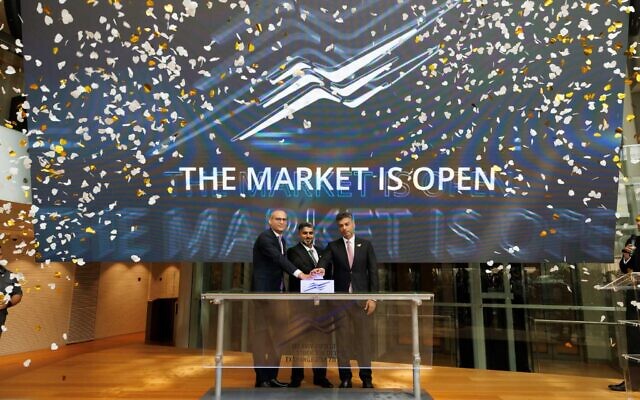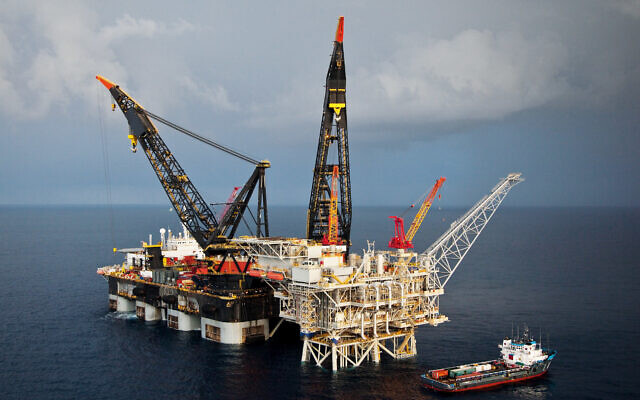‘Just scratched the surface’: Israel, UAE celebrate growing ties and trade
Two years after signing of Abraham Accords, enthusiasm and awe prevail at Tel Aviv business conference with Emirati delegation
Shoshanna Solomon is The Times of Israel's Startups and Business reporter

“My mother sends her regards to the people of Israel,” Fahima Al Bastaki, the chief business and market development officer of the Abu Dhabi Securities Exchange (ADX), said to laughter at a gathering of UAE and Israeli business leaders and officials on Tuesday in Tel Aviv.
The simple words perhaps best reflect the excitement, enthusiasm, and — still — awe that surround the growing ties between Israelis and Emiratis since the signing of the Abraham Accords on the White House lawn two years ago, holding the promise of opening up new cultural, tourism and economic worlds for citizens of both regions.
“It is surreal” to be in Tel Aviv, said an attendee at a conference held at the Tel Aviv Stock Exchange (TASE), which on Tuesday hosted Abu Dhabi’s largest business delegation to Israel.
“Who would have thought this could happen in our lifetime,” he added, words that were repeated over and over during the conference organized by the TASE for the delegation, which included representatives from the finance center Abu Dhabi Global Market (ADGM), the Abu Dhabi Fund of Development, Mubadala Investment Company, the national oil company ADNOC and the Abu Dhabi Securities Exchange among others.
“Who would have thought, two years ago, that this would have happened,” said TASE CEO Ittai Ben Zeev at the event, where he and UAE ambassador to Israel Mohamed Al Khaja and the chairman of ADGM, Ahmed Al Zaabi, rang the opening bell amid a flurry of confetti and wide smiles.
Israelis typically look West for their business, Ben Zeev said. “It is time to go East” for opportunities in trade, investments, and finance.

The aim of the conference was to expose the Abu Dhabi business community to Israeli companies listed on TASE, and to get better acquainted with the local economy, the TASE said in a statement.
It comes of the heels of the visit of TASE officials to the UAE and the ADGM in March, to further strengthen collaborations in the financial industry and facilitate a UAE-Israel economic corridor. During this September visit, “several mutually beneficial agreements” in a variety of fields will be signed, the statement said.
“Just two years ago, we didn’t dream of this,” said ambassador Al Khaja in his address. “A lot of Emiratis woke up for the first time here,” in Tel Aviv, he said, and gave themselves a “reality pinch.”
“Working together, entrepreneurs and businessmen in Israel and the UAE can be a catalyst for change in the region,” he added. These relationships can show the world “that good things can happen in this region, to create a better narrative” and an “alternative path for our people.”
Over 120 MOUs — memorandums of understanding — have been signed between the countries with more to come, he said, along with a double taxation agreement and a free trade agreement. There are currently 72 weekly flights between Israel and the UAE, which will rise to almost 80 a week in the coming weeks, he said.
Trade relations have surged, Al Khaja noted, and “we believe we can easily be Israel’s top five trading partner” within five years.
Since the start of the relationship, Israel and the UAE have seen trade jump over 500 percent to some $1.2 billion in 2021, from $190 million in 2020, said Shira Greenberg, chief economist at the Finance Ministry, at the conference. An investment treaty signed between the two countries to set out the infrastructure to enable mutual investments was negotiated and signed in just one week.
“It was the fastest agreement” ever signed by Israel, she said, and indicates the importance for both sides to build up their relations.
In the first half of 2022, trade (imports and exports) with the UAE totaled $774 million, according to the Economy and Industry Ministry.
Trade with Bahrain and Morocco, also part of the Abraham Accords, also rose. Total trade with Bahrain in the first half of 2022, in the January-June period, exceeded that of all of 2021 — $8.2 million, compared to $7.3 million. Trade with Morocco totaled $83 million in January-June 2022, after it rose to $148 million in 2021 from just $69 million in 2020.
Ties between Israel and the UAE, the first signatory to the Abraham Accords, appear to be the strongest for now. Notable deals between the two countries over the past two years include the reportedly $100 investment of Abu Dhabi’s sovereign wealth fund Mubadala Investment Co. in Israeli VC funds and in the startup Beewise, while Mubadala Petroleum acquired a 22% stake of Israel’s Tamar gas reservoir in 2021 for some $1 billion.

In January, Israel approved a multi-million dollar joint fund with the UAE to support collaboration in tech projects. There have also been joint projects in third countries: in June, Israel and the UAE entered into a collaboration to fund a healthcare project in Ghana, while Israeli internet service provider Bezeq International has partnered with Arc Solutions, a Dubai-based telecom infrastructure solutions provider, to provide joint telecom connections between Tel Aviv and Dubai.
At the conference on Tuesday, Mohammed Al Binali, in charge of growth and strategy at Hub71, Abu Dhabi’s global tech ecosystem backed by Mubadala, Abu Dhabi Investment Office and ADGM, said that six Israeli VC funds were already part of its ecosystem and they were onboarding the first Israeli startup.
“This is just the beginning of Israelis accessing our ecosystem,” he said.
Ismail Abdulla, the CEO of Strata, a wholly owned aerospace and manufacturing subsidiary of Mubadala, said the firm was looking for partners in Israel to work in the fields of biopharmaceuticals, robotics, water technologies and agri-tech, some of them new sectors the company is targeting.
We want partners “to bring things to the table, who want to use the UAE as a platform to launch not the Arab world and the Middle East,” Abdulla said.
Other panelists spoke about how Israelis and Emiratis should not look for a quick transactional relationship, but rather work toward setting up long-term ties, getting to know each other’s culture and ways of work, based on “trust and transparency.”

Entrepreneurs on both sides should collaborate, not to capture market share in each other’s playing field but with the view of going “after the rest of the world.” Israel should be a gateway to the West for the Emiratis, while the UAE should be a gateway to the East for Israelis, the speakers said, adding that relations have so far “just scratched the surface.”
The ties could also help boost liquidity in the local stock exchanges, Ben Zeev said on the sidelines of the conference. Israeli brokers could offer Emirati shares to Israeli investors, whereas international brokers could offer Emiratis attractive investment opportunities in Israeli securities, he said.
“There is a lot of potential in creating those liquidity pools,” he said.
In a few years, Ben Zeev added, Israelis and Emiratis will be doing business together across a wide range of business segments. “This is a huge opportunity for Israel to do many great things with regions they have never worked with before.”









